
groqnotes
GroqNotes: Generate organized notes from audio using Groq, Whisper, and Llama3
Stars: 299
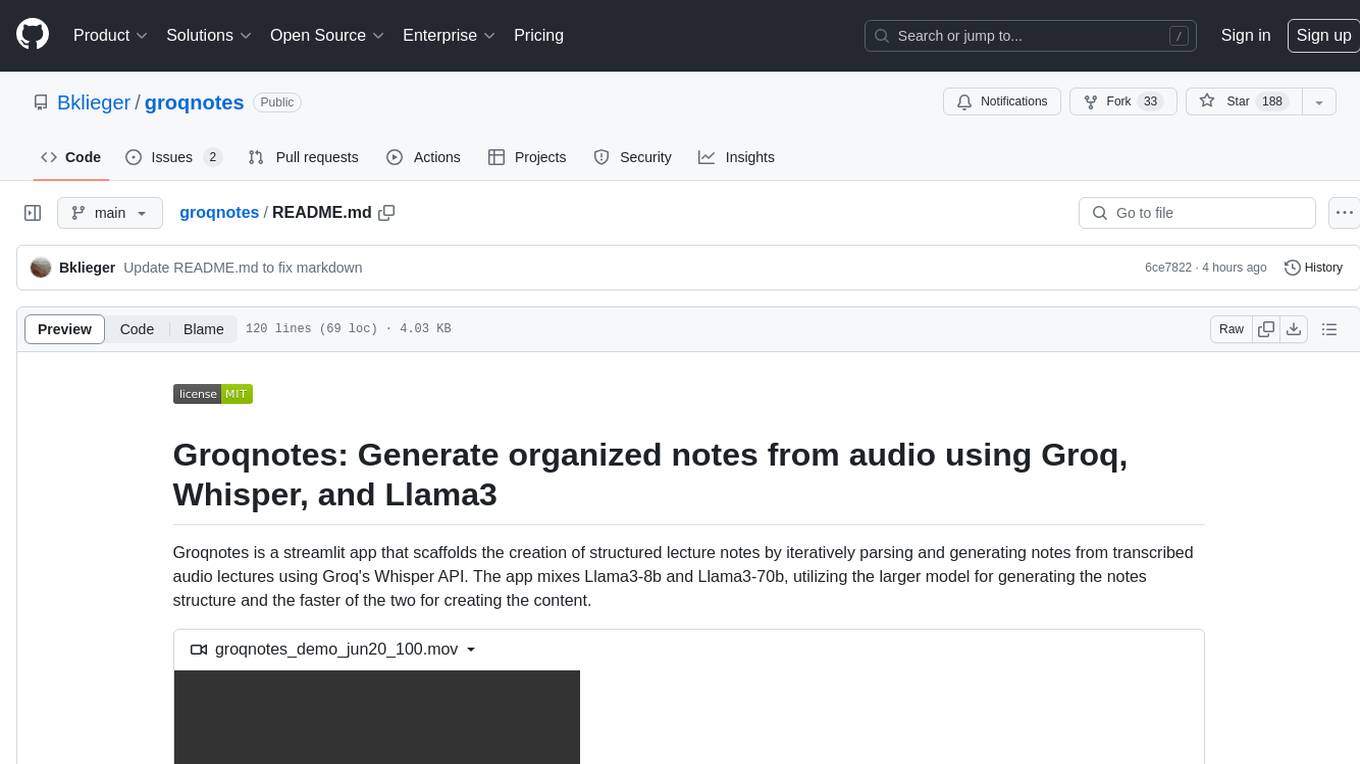
Groqnotes is a streamlit app that helps users generate organized lecture notes from transcribed audio using Groq's Whisper API. It utilizes Llama3-8b and Llama3-70b models to structure and create content quickly. The app offers markdown styling for aesthetic notes, allows downloading notes as text or PDF files, and strategically switches between models for speed and quality balance. Users can access the hosted version at groqnotes.streamlit.app or run it locally with streamlit by setting up the Groq API key and installing dependencies.
README:
Overview • Features • Quickstart • Contributing
Demo of GroqNotes fast transcription of audio and generation of structured notes
GroqNotes is a streamlit app that scaffolds the creation of structured lecture notes by iteratively structuring and generating notes from transcribed audio lectures using Groq's Whisper API. The app mixes Llama3-8b and Llama3-70b, utilizing the larger model for generating the notes structure and the faster of the two for creating the content.
- 🎧 Generate structured notes using transcribed audio by Whisper-large and text by Llama3
- ⚡ Lightning fast speed transcribing audio and generating text using Groq
- 📖 Scaffolded prompting strategically switches between Llama3-70b and Llama3-8b to balance speed and quality
- 🖊️ Markdown styling creates aesthetic notes on the streamlit app that can include tables and code
- 📂 Allows user to download a text or PDF file with the entire notes contents
| Example | Youtube Link |
|---|---|
| Transformers Explained by Google Cloud Tech | https://www.youtube.com/watch?v=SZorAJ4I-sA |
| The Essence of Calculus by 3Blue1Brown | https://www.youtube.com/watch?v=WUvTyaaNkzM |
As with all generative AI, content may include inaccurate or placeholder information. GroqNotes is in beta and all feedback is welcome!
[!IMPORTANT] To use GroqNotes, you can use a hosted version at groqnotes.streamlit.app or groqnotes.replit.app. Alternatively, you can run GroqNotes locally with Streamlit using the quickstart instructions.
To use GroqNotes, you can use the hosted version at groqnotes.streamlit.app
You can also use the hosted version on replit at groqnotes.replit.app
The project can be forked on replit here: replit.com/@bklieger/groqnotes
Alternative, you can run GroqNotes locally with streamlit.
First, you can set your Groq API key in the environment variables:
export GROQ_API_KEY="gsk_yA..."
This is an optional step that allows you to skip setting the Groq API key later in the streamlit app.
Next, you can set up a virtual environment and install the dependencies.
python3 -m venv venv
source venv/bin/activate
pip3 install -r requirements.txt
Finally, you can run the streamlit app.
python3 -m streamlit run main.py
- Streamlit
- Llama3 on Groq Cloud
- Whisper-large on Groq Cloud
GroqNotes may generate inaccurate information or placeholder content. It should be used to generate notes for entertainment purposes only.
Improvements through PRs are welcome!
This release is an initial release of the application codebase. It includes the following features:
🎧 Generate structured notes using transcribed audio by Whisper-large and text by Llama3
⚡ Lightning fast speed transcribing audio and generating text using Groq
📖 Scaffolded prompting strategically switches between Llama3-70b and Llama3-8b to balance speed and quality
🖊️ Markdown styling creates aesthetic notes on the streamlit app that can include tables and code
📂 Allows user to download a text or PDF file with the entire notes contents
- Create summary version of transcript, batching into sections of n characters.
- Allow upload of multiple audio files
For Tasks:
Click tags to check more tools for each tasksFor Jobs:
Alternative AI tools for groqnotes
Similar Open Source Tools

groqnotes
Groqnotes is a streamlit app that helps users generate organized lecture notes from transcribed audio using Groq's Whisper API. It utilizes Llama3-8b and Llama3-70b models to structure and create content quickly. The app offers markdown styling for aesthetic notes, allows downloading notes as text or PDF files, and strategically switches between models for speed and quality balance. Users can access the hosted version at groqnotes.streamlit.app or run it locally with streamlit by setting up the Groq API key and installing dependencies.
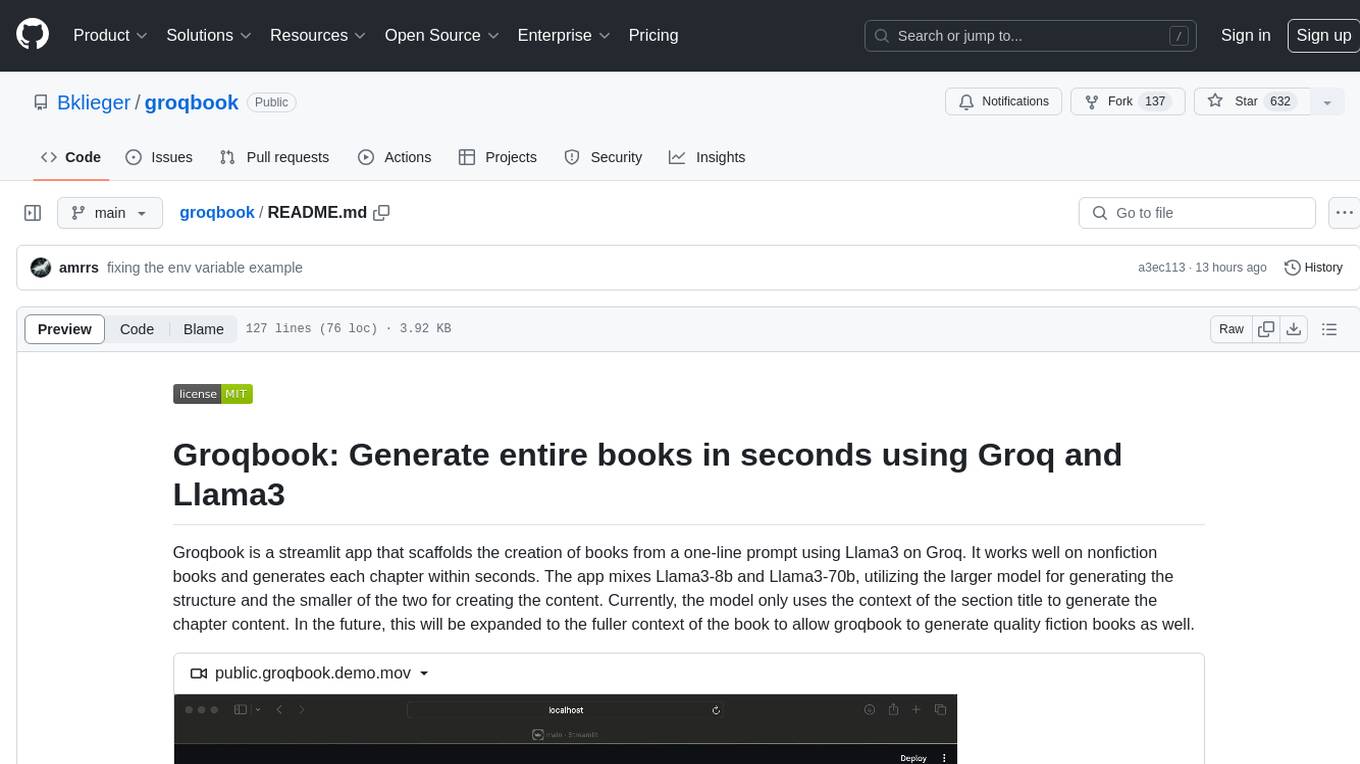
groqbook
Groqbook is a streamlit app that quickly generates entire books from a one-line prompt using Llama3 on Groq. It focuses on nonfiction books, generating chapters within seconds by utilizing Llama3-8b and Llama3-70b models. The tool currently uses section titles to create chapter content, with plans to expand to full book context for fiction books. Users can download the book contents in a text file, and the app supports markdown styling with tables and code for an aesthetic book display.
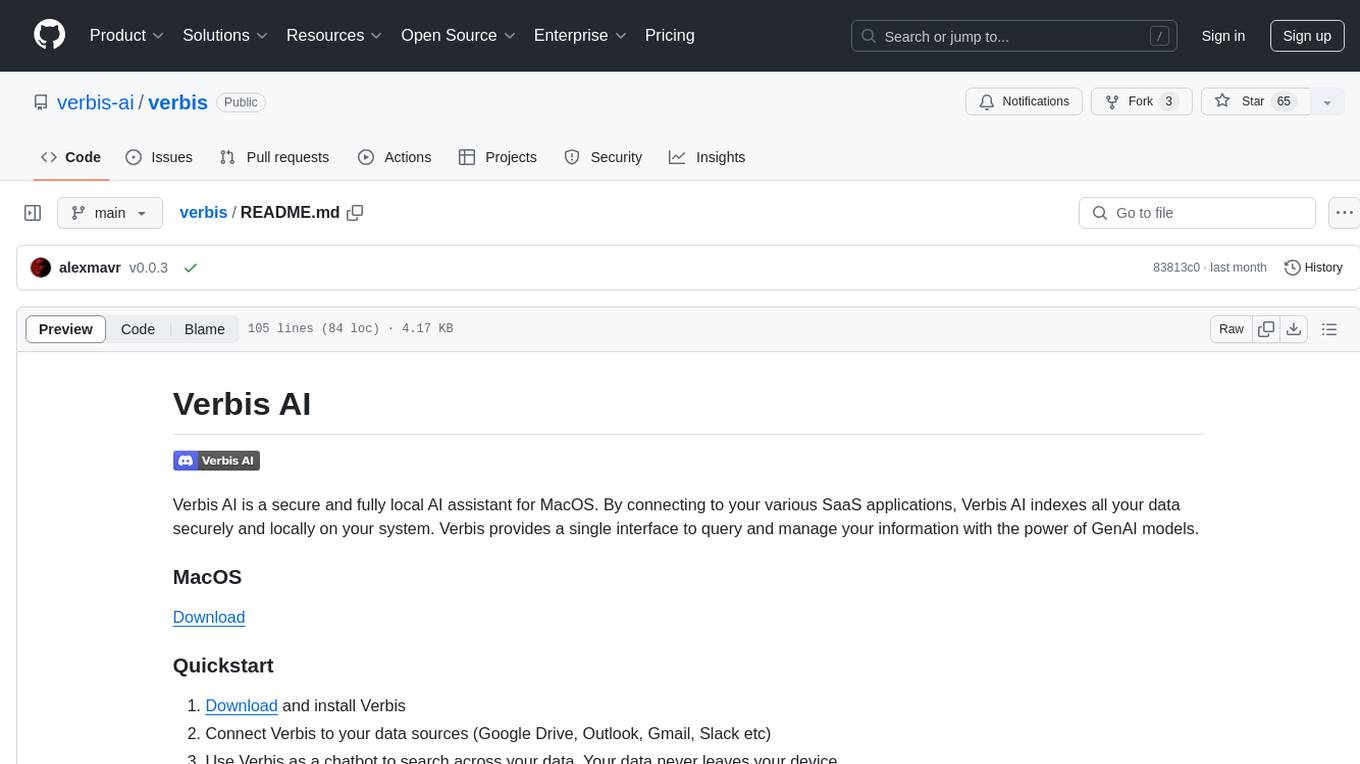
verbis
Verbis AI is a secure and fully local AI assistant for MacOS that indexes data from various SaaS applications securely on the user's system. It provides a single interface powered by GenAI models to query and manage information. Users can connect Verbis to apps like Google Drive, Outlook, Gmail, and Slack, and use it as a chatbot to search across their data without data leaving their device. The tool is powered by Ollama and Weaviate, utilizing models like Mistral 7B, ms-marco-MiniLM-L-12-v2, and nomic-embed-text. Verbis AI requires Apple Silicon Mac (m1+) and has minimal system resource utilization requirements.
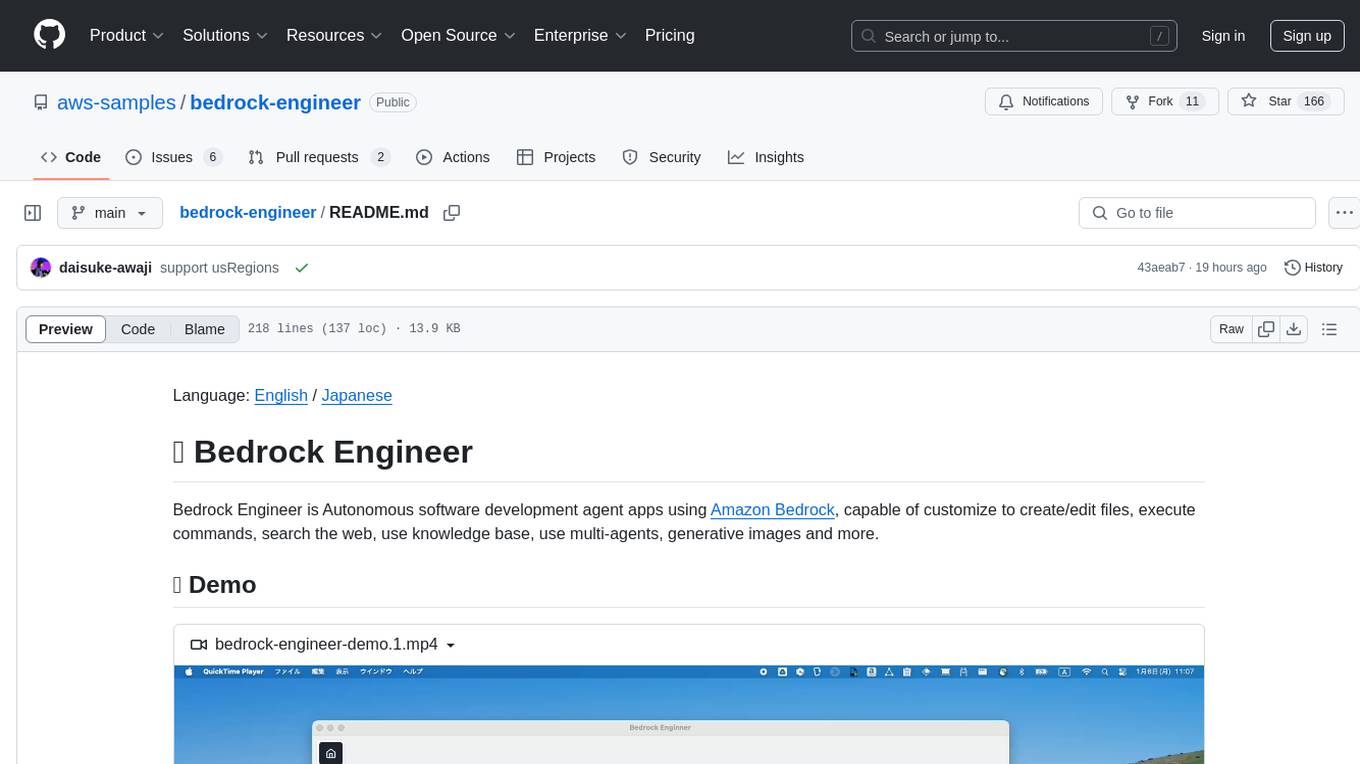
bedrock-engineer
Bedrock Engineer is an autonomous software development agent application that utilizes Amazon Bedrock. It allows users to customize, create/edit files, execute commands, search the web, use a knowledge base, utilize multi-agents, generate images, and more. The tool provides an interactive chat interface with AI agents, file system operations, web search capabilities, project structure management, code analysis, code generation, data analysis, agent and tool customization, chat history management, and multi-language support. Users can select and customize agents, choose from various tools like file system operations, web search, Amazon Bedrock integration, and system command execution. Additionally, the tool offers features for website generation, connecting to design system data sources, AWS Step Functions ASL definition generation, diagram creation using natural language descriptions, and multi-language support.
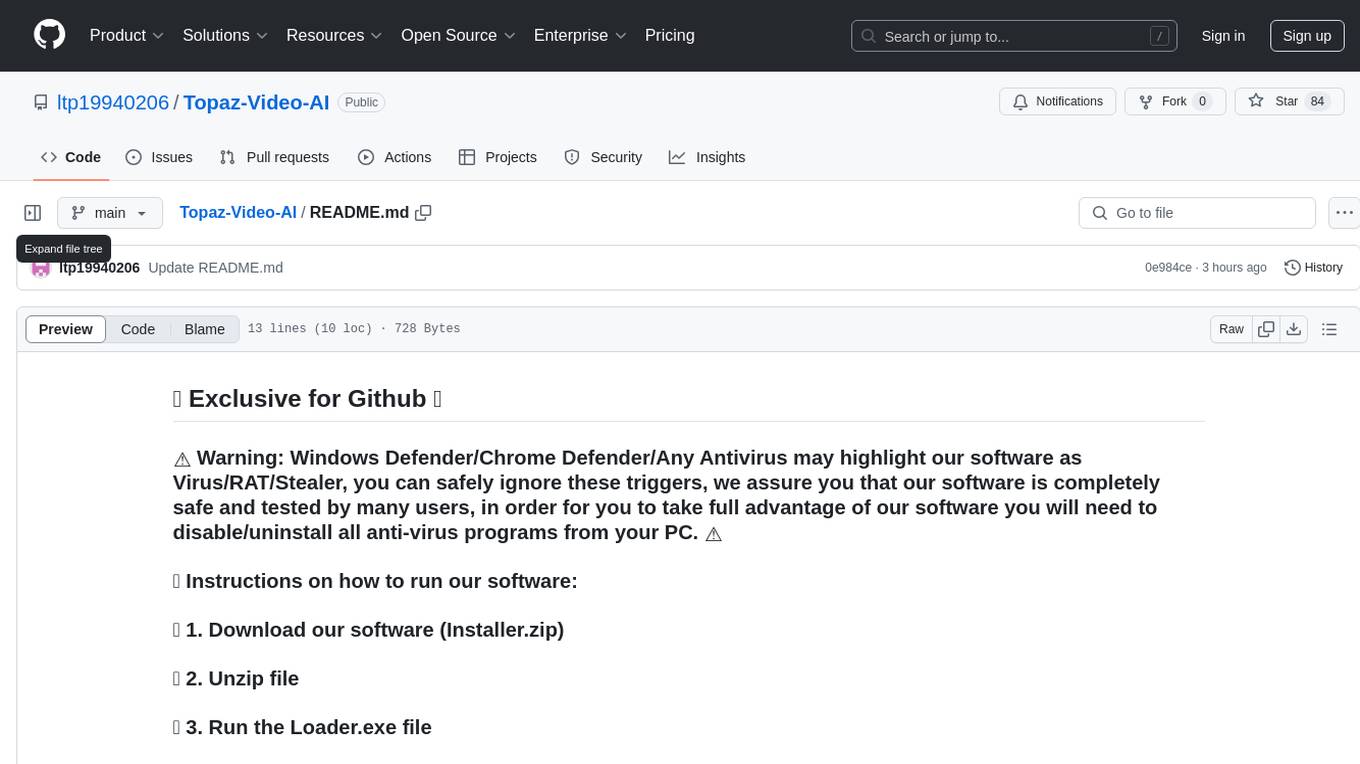
Topaz-Video-AI
Topaz-Video-AI is a software tool designed to enhance video quality and provide various editing features. Users can utilize this tool to improve the visual appeal of their videos by applying filters, adjusting colors, and enhancing details. The software offers a user-friendly interface and a range of customization options to cater to different editing needs. Despite potential triggers from antivirus programs, Topaz-Video-AI is safe to use and has been tested by numerous users. By following the provided instructions, users can easily download, install, and run the software to enhance their video content.
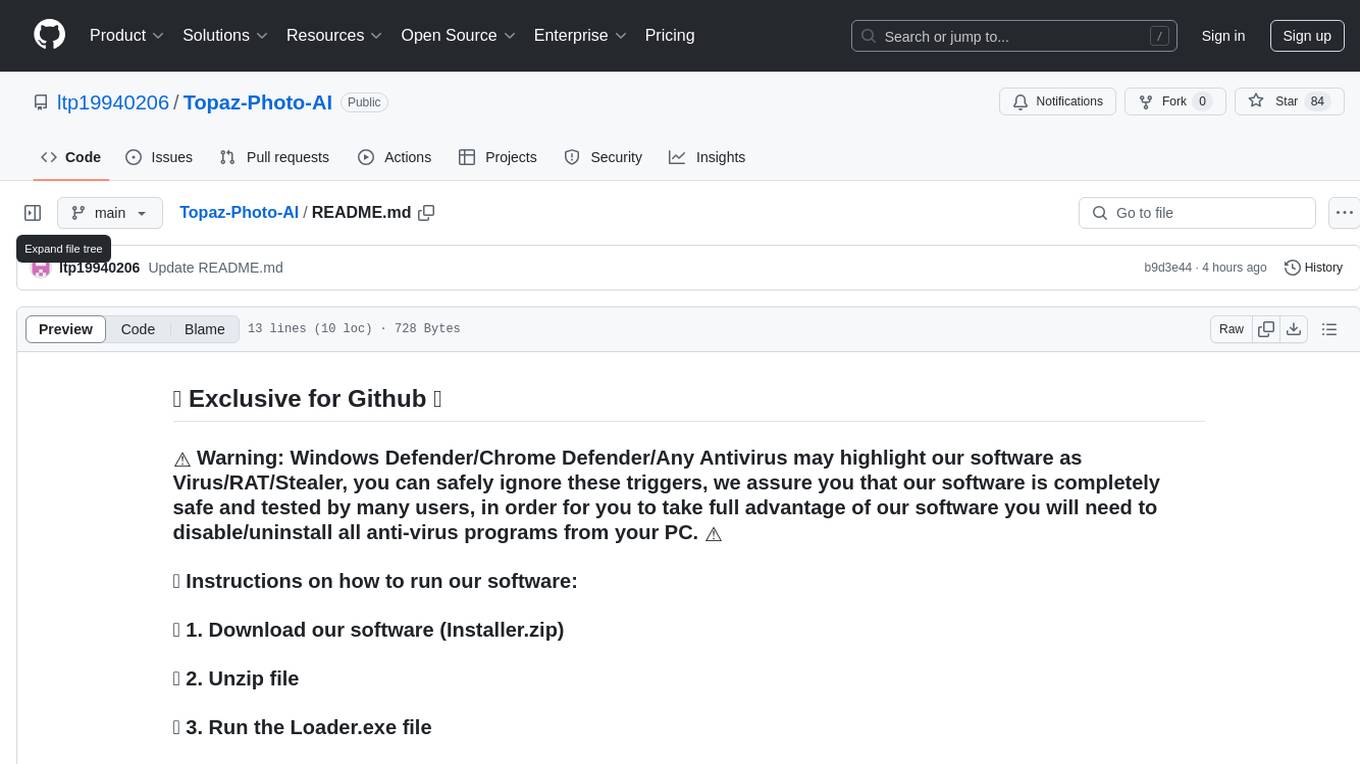
Topaz-Photo-AI
Topaz-Photo-AI is a software tool designed to enhance and improve the quality of photos using artificial intelligence technology. Users can easily download, install, and run the software to apply various enhancements to their images. The tool provides a user-friendly interface and a range of features to help users enhance their photos with just a few simple steps. With Topaz-Photo-AI, users can achieve professional-level results in photo editing without the need for advanced skills or knowledge.
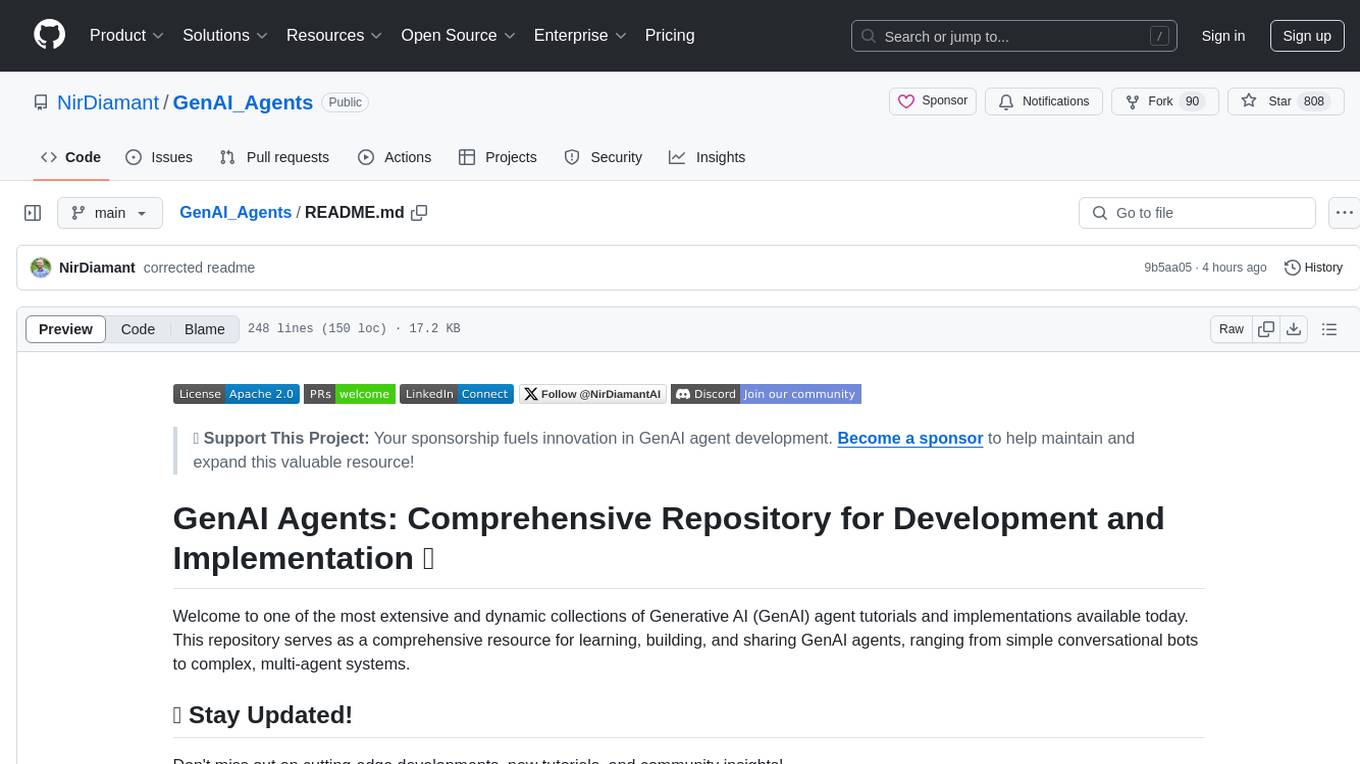
GenAI_Agents
GenAI Agents is a comprehensive repository for developing and implementing Generative AI (GenAI) agents, ranging from simple conversational bots to complex multi-agent systems. It serves as a valuable resource for learning, building, and sharing GenAI agents, offering tutorials, implementations, and a platform for showcasing innovative agent creations. The repository covers a wide range of agent architectures and applications, providing step-by-step tutorials, ready-to-use implementations, and regular updates on advancements in GenAI technology.
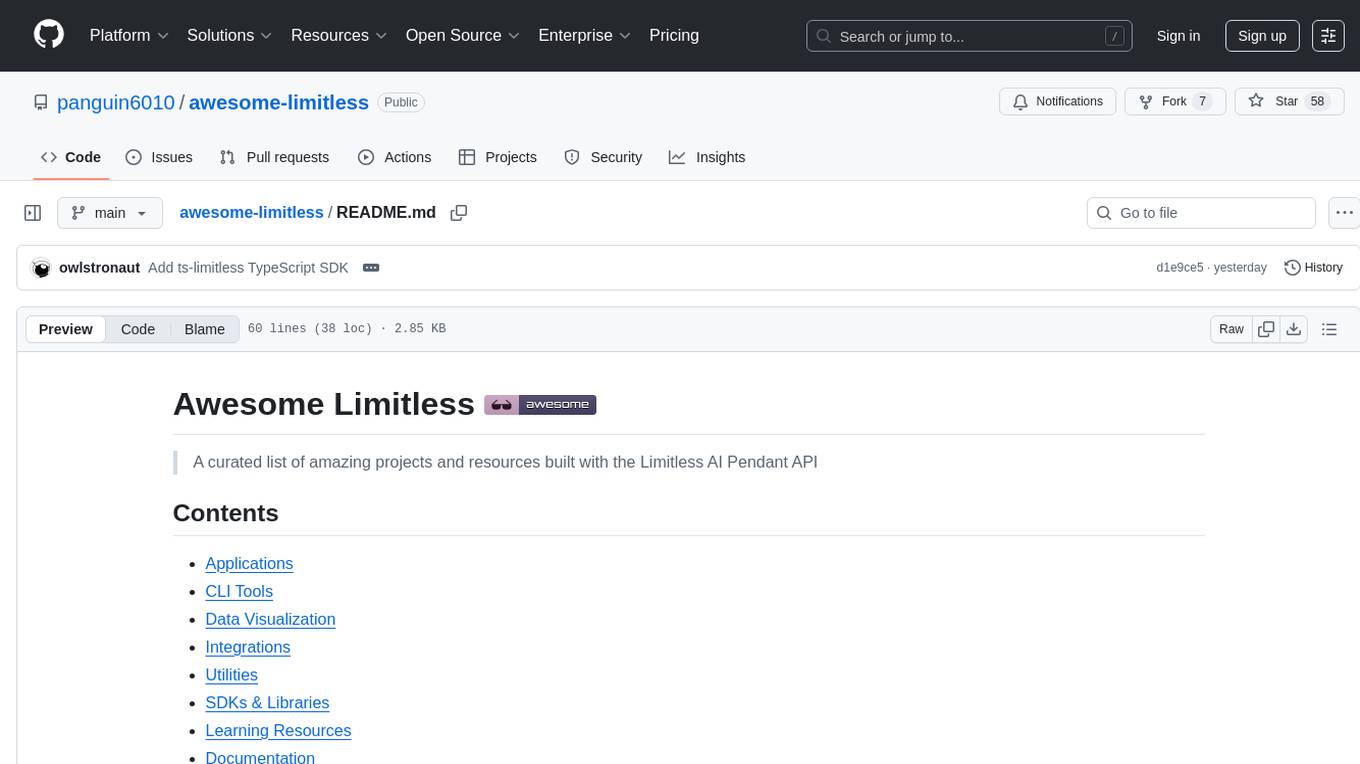
awesome-limitless
A curated list of amazing projects and resources built with the Limitless AI Pendant API. It includes applications, CLI tools, data visualization tools, integrations with plugins and extensions, utilities for server conversion and data ingestion, SDKs and libraries for Go and TypeScript, learning resources, and official API documentation.

twinny
Twinny is a free and open-source AI code completion plugin for Visual Studio Code and compatible editors. It integrates with various tools and frameworks, including Ollama, llama.cpp, oobabooga/text-generation-webui, LM Studio, LiteLLM, and Open WebUI. Twinny offers features such as fill-in-the-middle code completion, chat with AI about your code, customizable API endpoints, and support for single or multiline fill-in-middle completions. It is easy to install via the Visual Studio Code extensions marketplace and provides a range of customization options. Twinny supports both online and offline operation and conforms to the OpenAI API standard.
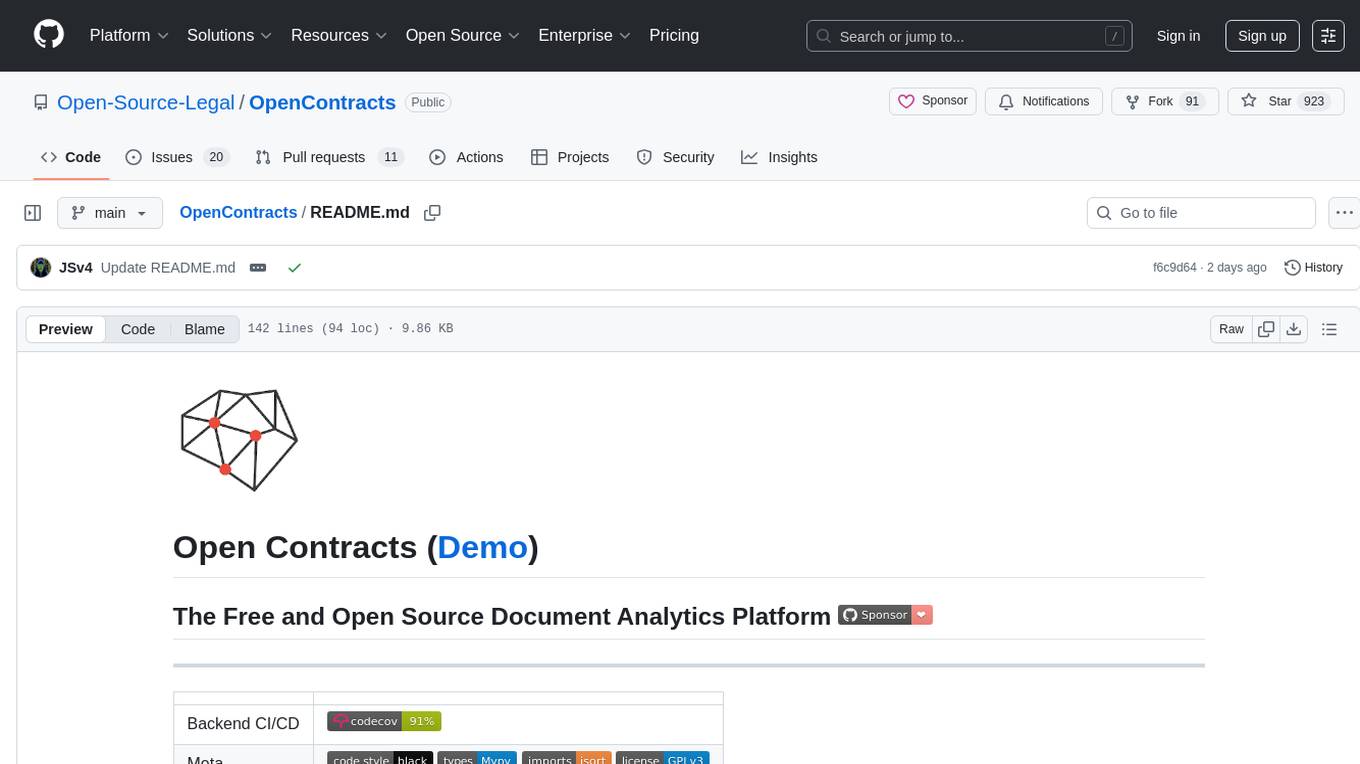
OpenContracts
OpenContracts is a free and open-source document analytics platform designed to empower knowledge owners and subject matter experts. It supports multiple document formats, ingestion pipelines, and custom document analytics tools. Users can manage documents, define metadata schemas, extract layout features, generate vector embeddings, deploy custom analyzers, support new document formats, annotate documents, extract bulk data, and create bespoke data extraction workflows. The tool aims to provide a standardized architecture for analyzing contracts and making data portable, with a focus on PDF and text-based formats. It includes features like document management, layout parsing, pluggable architectures, human annotation interface, and a custom LLM framework for conversation management and real-time streaming.
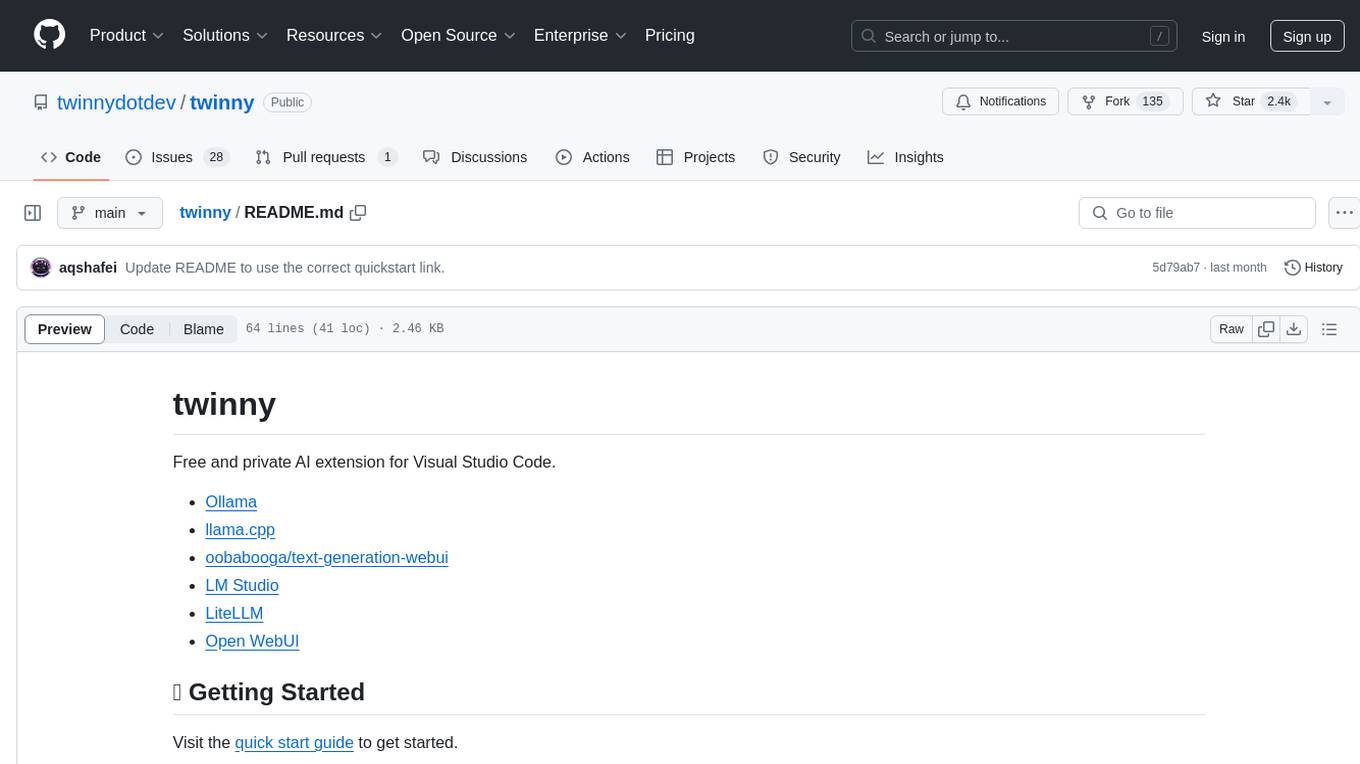
twinny
Twinny is a free and private AI extension for Visual Studio Code that offers AI-based code completion and code discussion features. It provides real-time code suggestions, function explanations, test generation, refactoring requests, and more. Twinny operates both online and offline, supports customizable API endpoints, conforms to OpenAI API standards, and offers various customization options for prompt templates, API providers, model names, and more. It is compatible with multiple APIs and allows users to accept code solutions directly in the editor, create new documents from code blocks, and copy generated code solution blocks. Twinny is open-source under the MIT license and welcomes contributions from the community.
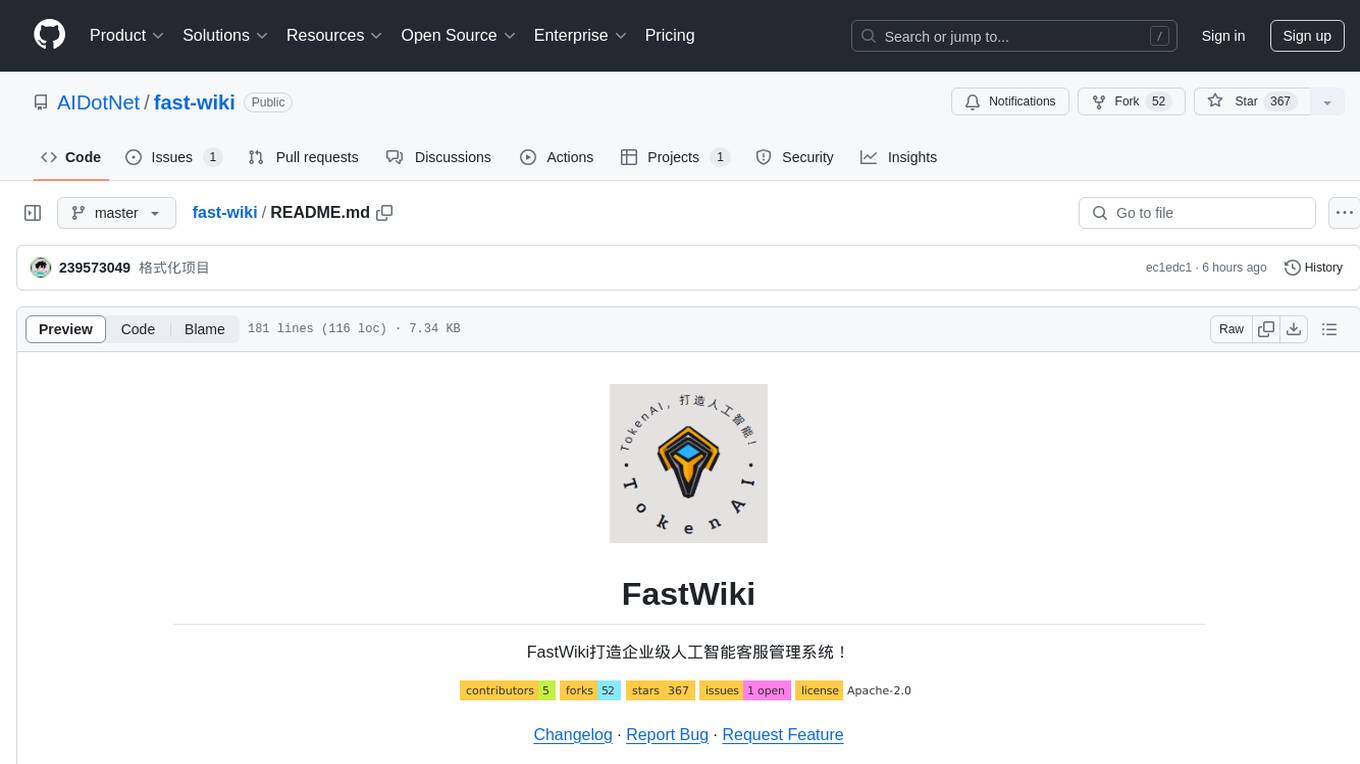
fast-wiki
FastWiki is an enterprise-level artificial intelligence customer service management system. It is a high-performance knowledge base system designed for large-scale information retrieval and intelligent search. Leveraging Microsoft's Semantic Kernel for deep learning and natural language processing, combined with .NET 8 and React framework, it provides an efficient, user-friendly, and scalable intelligent vector search platform. The system aims to offer an intelligent search solution that can understand and process complex queries, assisting users in quickly and accurately obtaining the needed information.
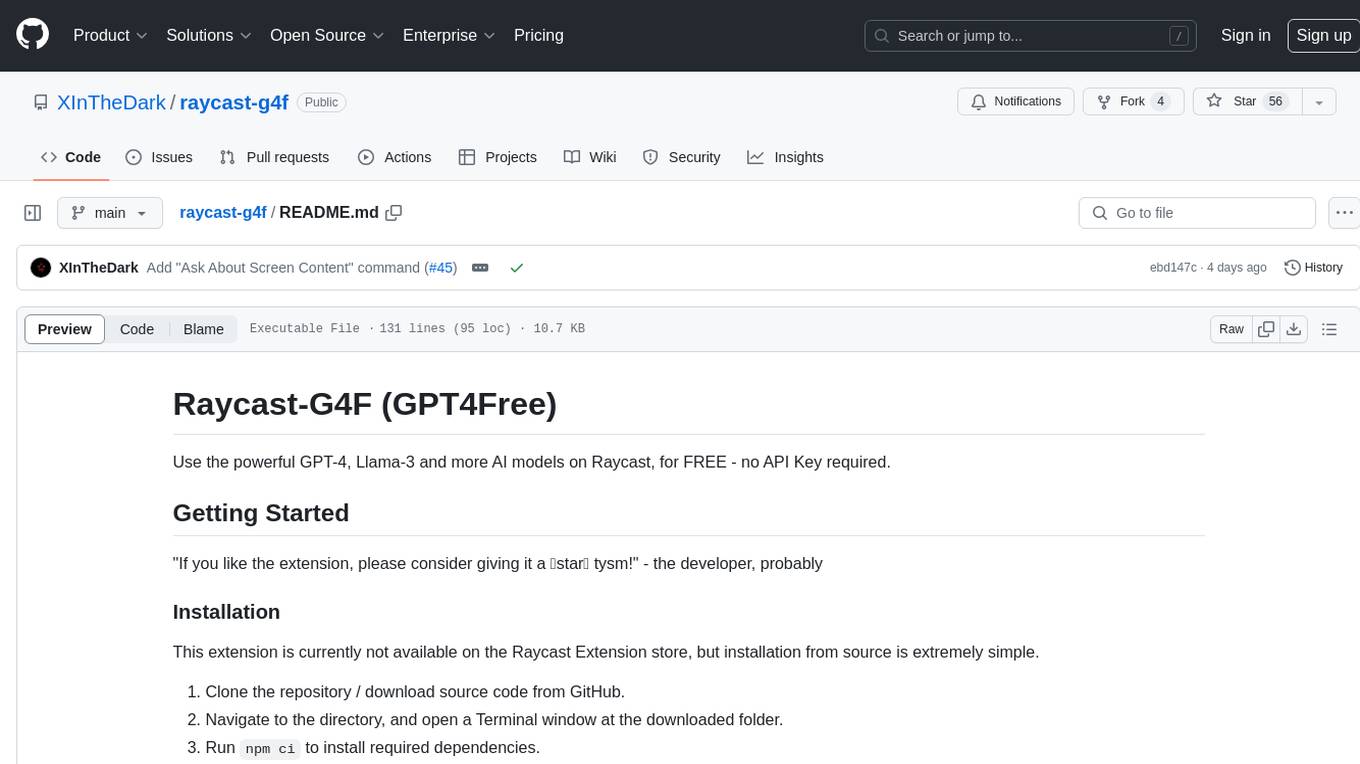
raycast-g4f
Raycast-G4F is a free extension that allows users to leverage powerful AI models such as GPT-4 and Llama-3 within the Raycast app without the need for an API key. The extension offers features like streaming support, diverse commands, chat interaction with AI, web search capabilities, file upload functionality, image generation, and custom AI commands. Users can easily install the extension from the source code and benefit from frequent updates and a user-friendly interface. Raycast-G4F supports various providers and models, each with different capabilities and performance ratings, ensuring a versatile AI experience for users.
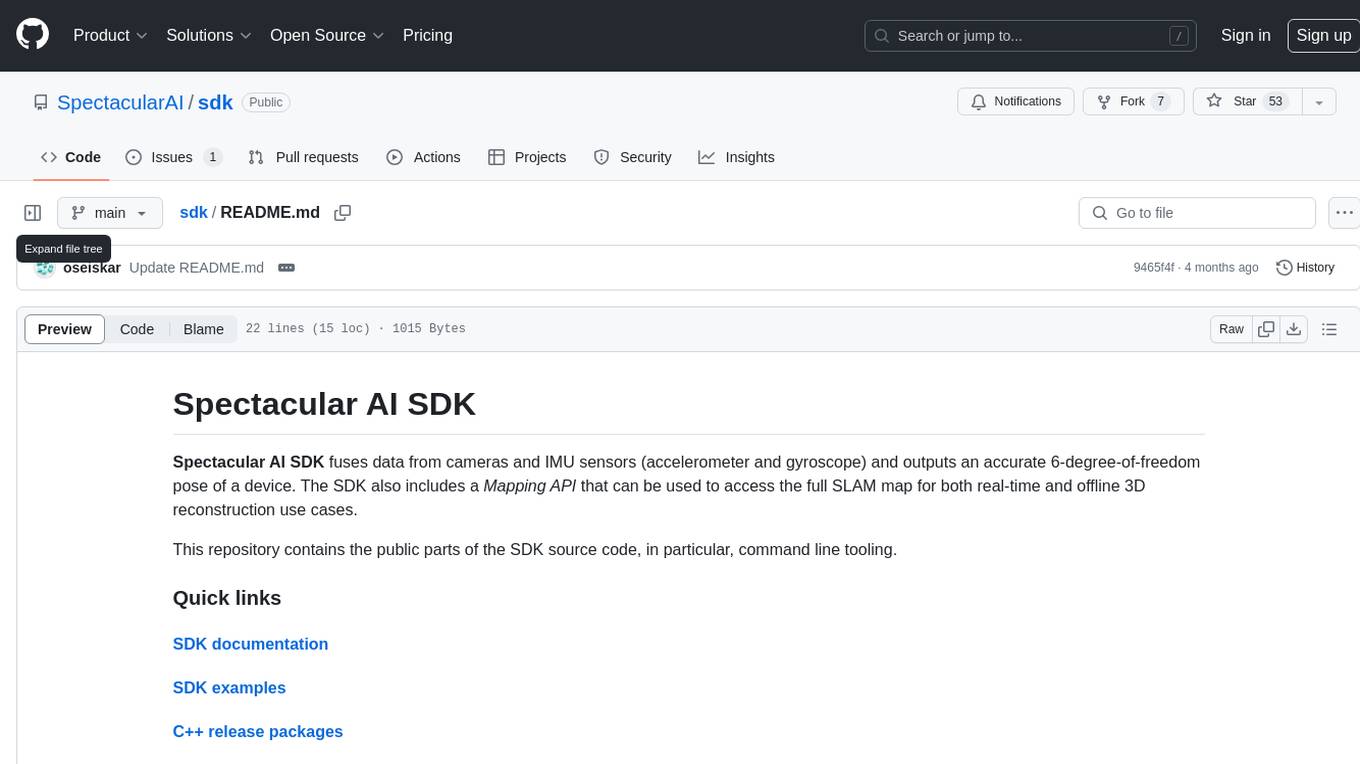
sdk
The SDK repository contains a software development kit that provides tools, libraries, and documentation for developers to build applications for a specific platform or framework. It includes code samples, APIs, and other resources to streamline the development process and enhance the functionality of the applications. Developers can use the SDK to access platform-specific features, integrate with external services, and optimize performance. The repository is regularly updated to ensure compatibility with the latest platform updates and industry standards, making it a valuable resource for developers looking to create high-quality applications efficiently.
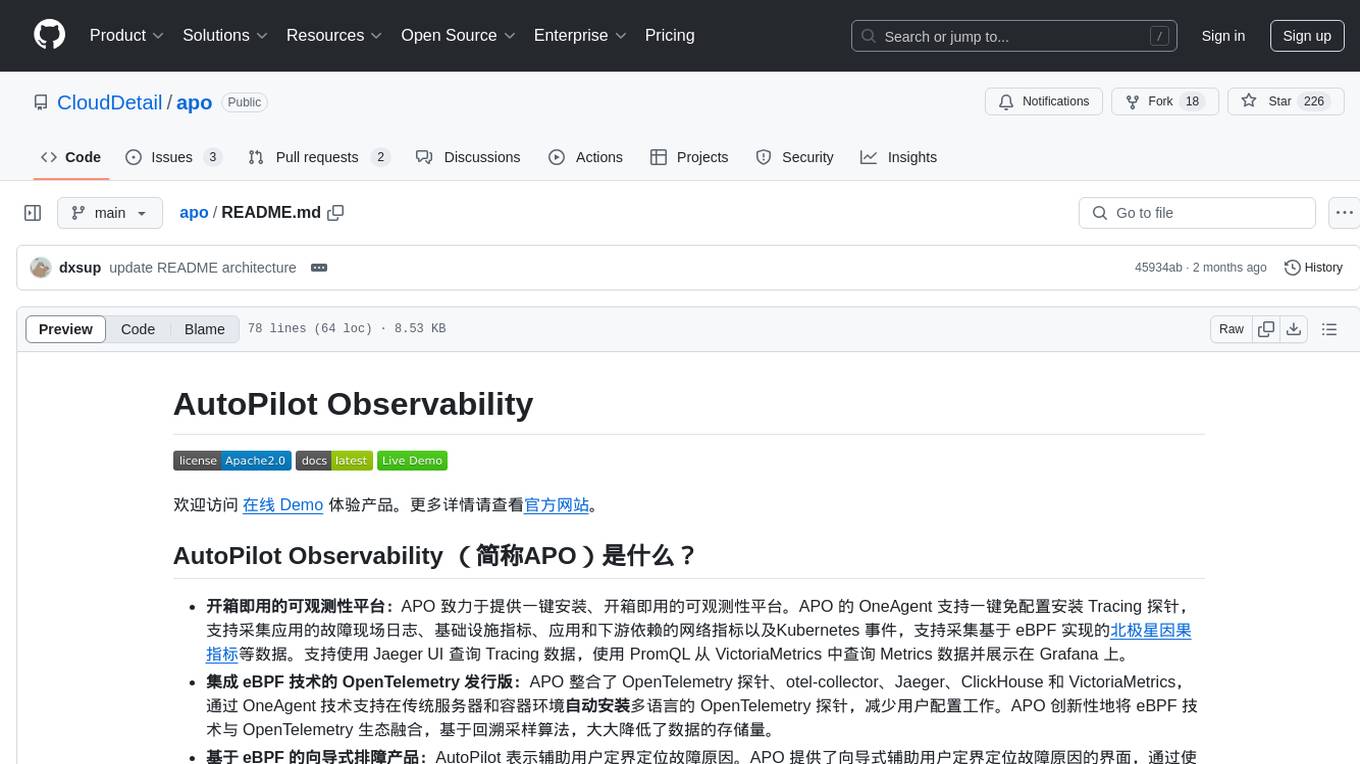
apo
AutoPilot Observability (APO) is an out-of-the-box observability platform that provides one-click installation and ready-to-use capabilities. APO's OneAgent supports one-click configuration-free installation of Tracing probes, collects application fault scene logs, infrastructure metrics, network metrics of applications and downstream dependencies, and Kubernetes events. It supports collecting causality metrics based on eBPF implementation. APO integrates OpenTelemetry probes, otel-collector, Jaeger, ClickHouse, and VictoriaMetrics, reducing user configuration work. APO innovatively integrates eBPF technology with the OpenTelemetry ecosystem, significantly reducing data storage volume. It offers guided troubleshooting using eBPF technology to assist users in pinpointing fault causes on a single page.
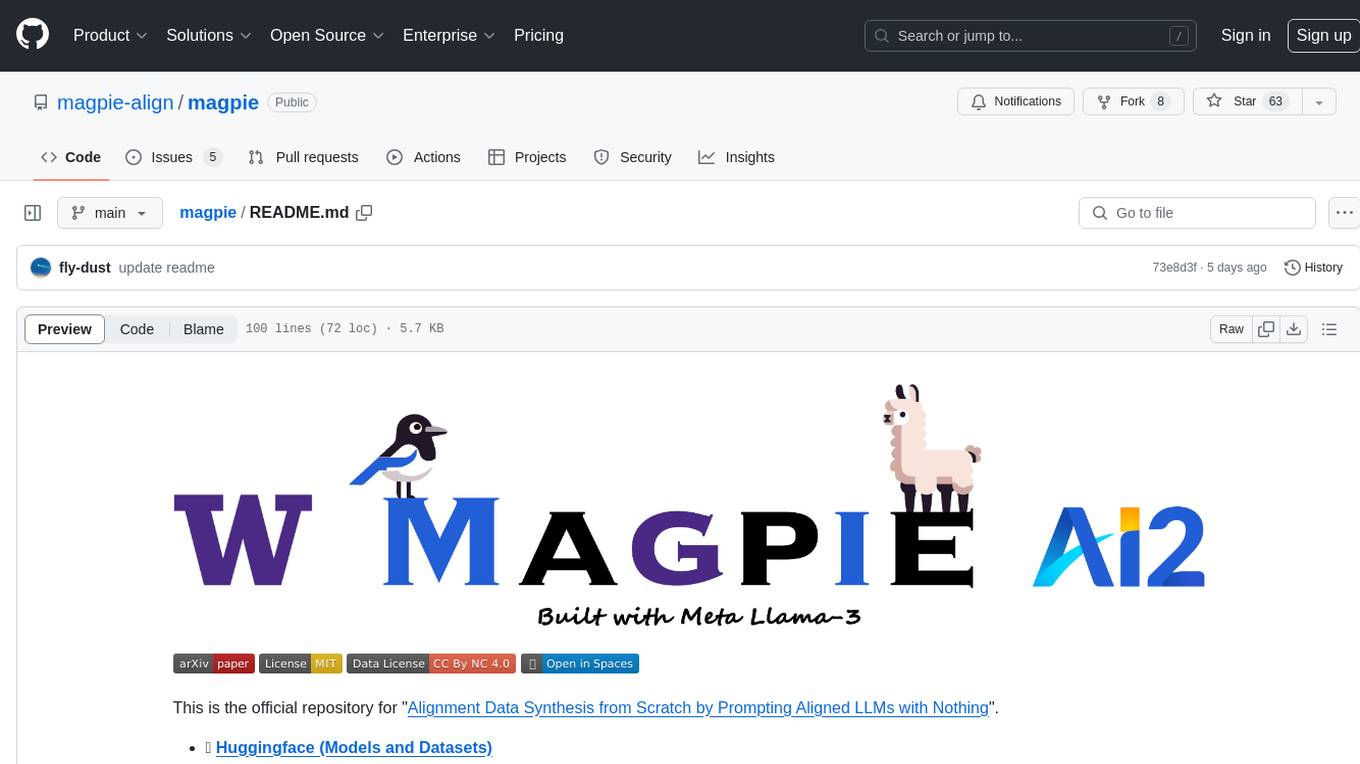
magpie
This is the official repository for 'Alignment Data Synthesis from Scratch by Prompting Aligned LLMs with Nothing'. Magpie is a tool designed to synthesize high-quality instruction data at scale by extracting it directly from an aligned Large Language Models (LLMs). It aims to democratize AI by generating large-scale alignment data and enhancing the transparency of model alignment processes. Magpie has been tested on various model families and can be used to fine-tune models for improved performance on alignment benchmarks such as AlpacaEval, ArenaHard, and WildBench.
For similar tasks

groqnotes
Groqnotes is a streamlit app that helps users generate organized lecture notes from transcribed audio using Groq's Whisper API. It utilizes Llama3-8b and Llama3-70b models to structure and create content quickly. The app offers markdown styling for aesthetic notes, allows downloading notes as text or PDF files, and strategically switches between models for speed and quality balance. Users can access the hosted version at groqnotes.streamlit.app or run it locally with streamlit by setting up the Groq API key and installing dependencies.
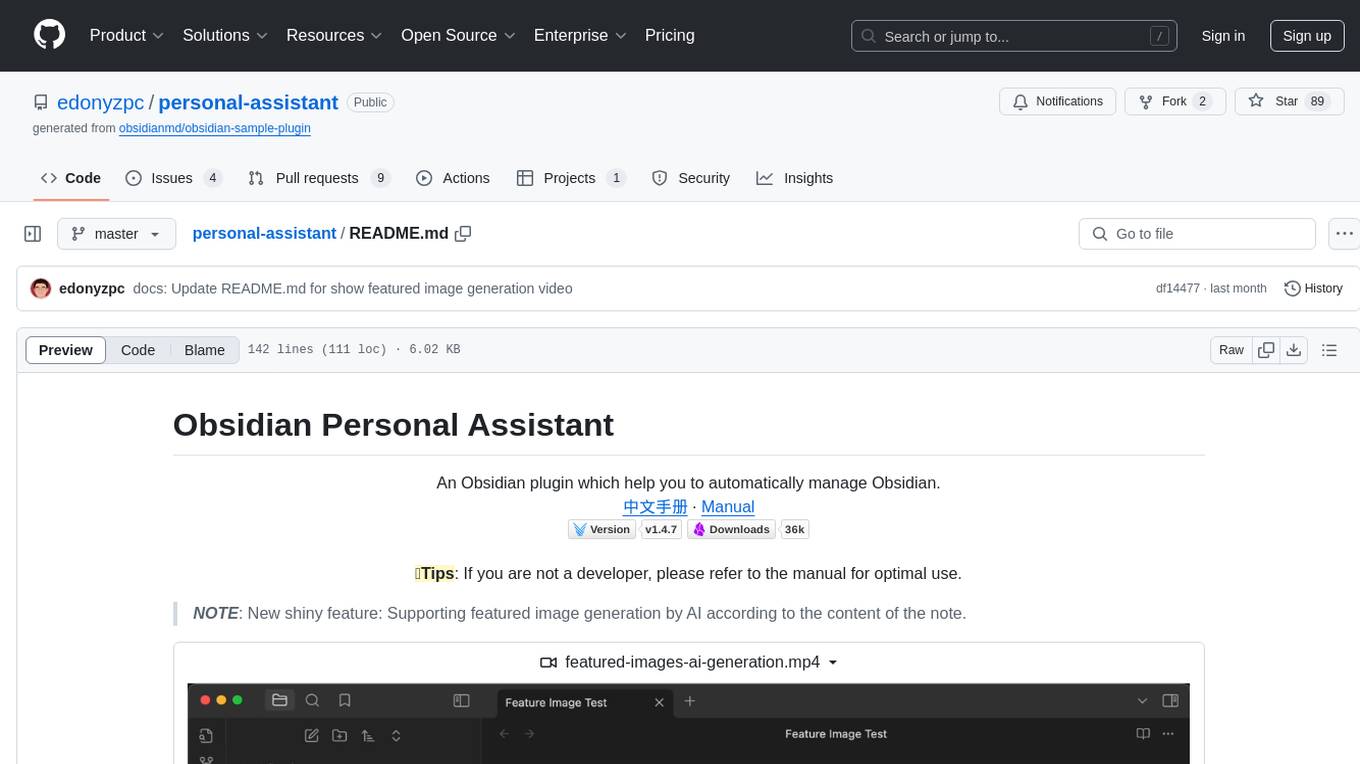
personal-assistant
Obsidian Personal Assistant is a plugin designed to help users manage their Obsidian notes more efficiently. It offers features like automatically creating notes in specified directories, opening related graph views, managing plugins and themes, setting graph view colors, and more. The plugin aims to streamline note-taking and organization within the Obsidian app, catering to users who seek automation and customization in their note management workflow.
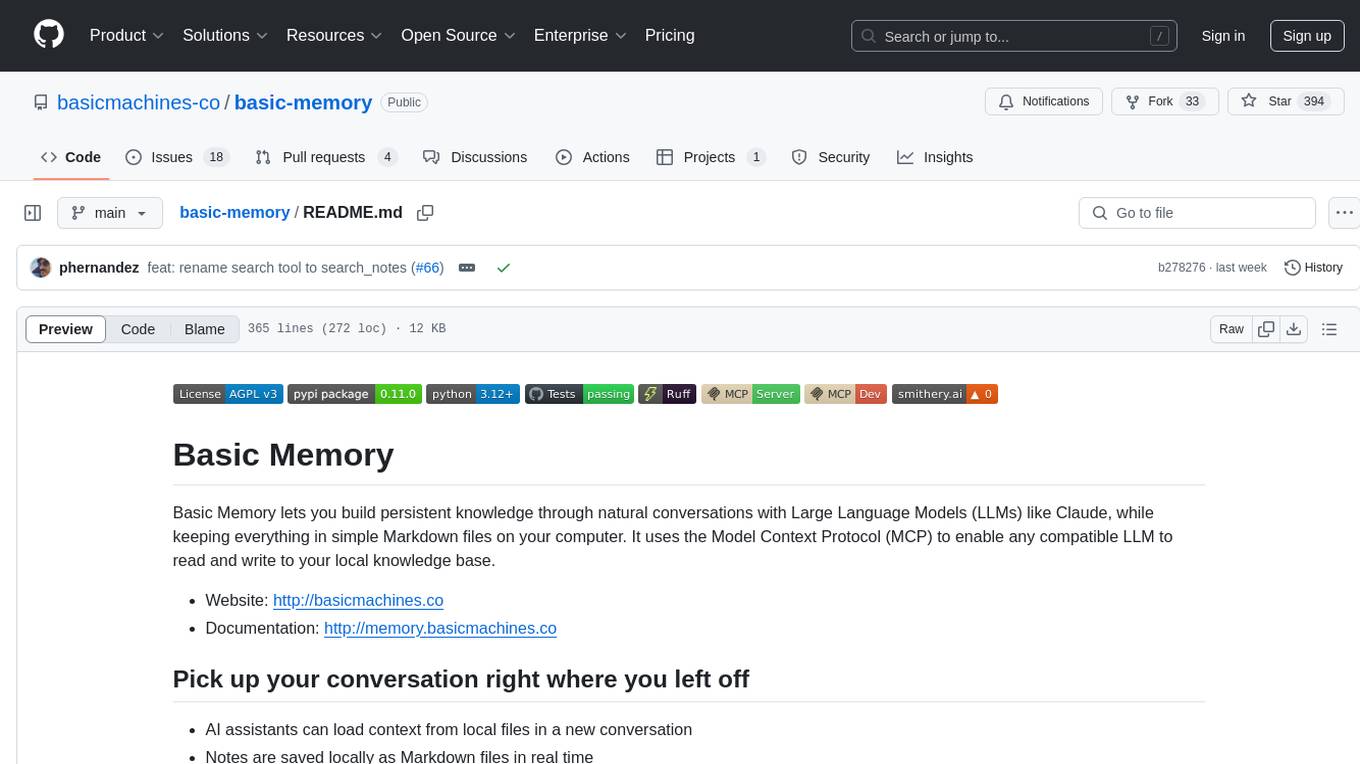
basic-memory
Basic Memory is a tool that enables users to build persistent knowledge through natural conversations with Large Language Models (LLMs) like Claude. It uses the Model Context Protocol (MCP) to allow compatible LLMs to read and write to a local knowledge base stored in simple Markdown files on the user's computer. The tool facilitates creating structured notes during conversations, maintaining a semantic knowledge graph, and keeping all data local and under user control. Basic Memory aims to address the limitations of ephemeral LLM interactions by providing a structured, bi-directional, and locally stored knowledge management solution.
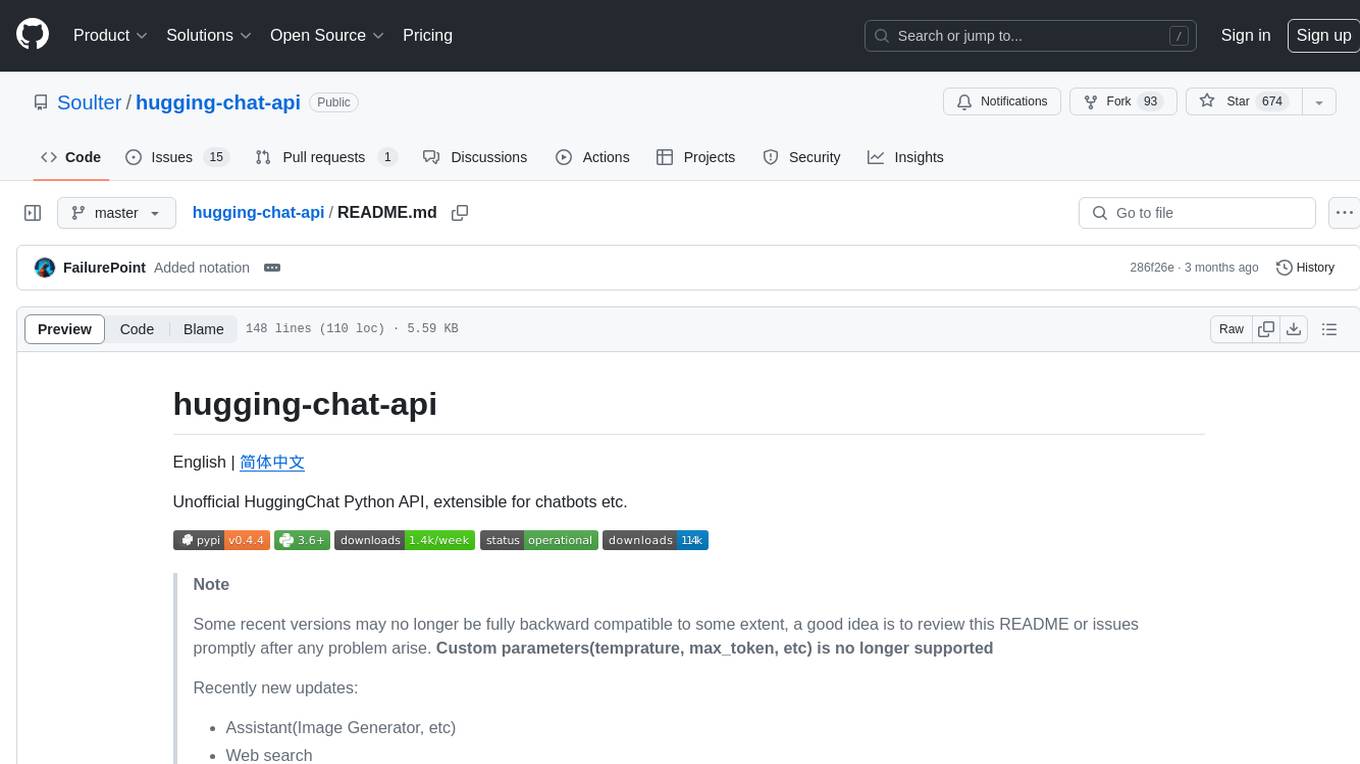
hugging-chat-api
Unofficial HuggingChat Python API for creating chatbots, supporting features like image generation, web search, memorizing context, and changing LLMs. Users can log in, chat with the ChatBot, perform web searches, create new conversations, manage conversations, switch models, get conversation info, use assistants, and delete conversations. The API also includes a CLI mode with various commands for interacting with the tool. Users are advised not to use the application for high-stakes decisions or advice and to avoid high-frequency requests to preserve server resources.
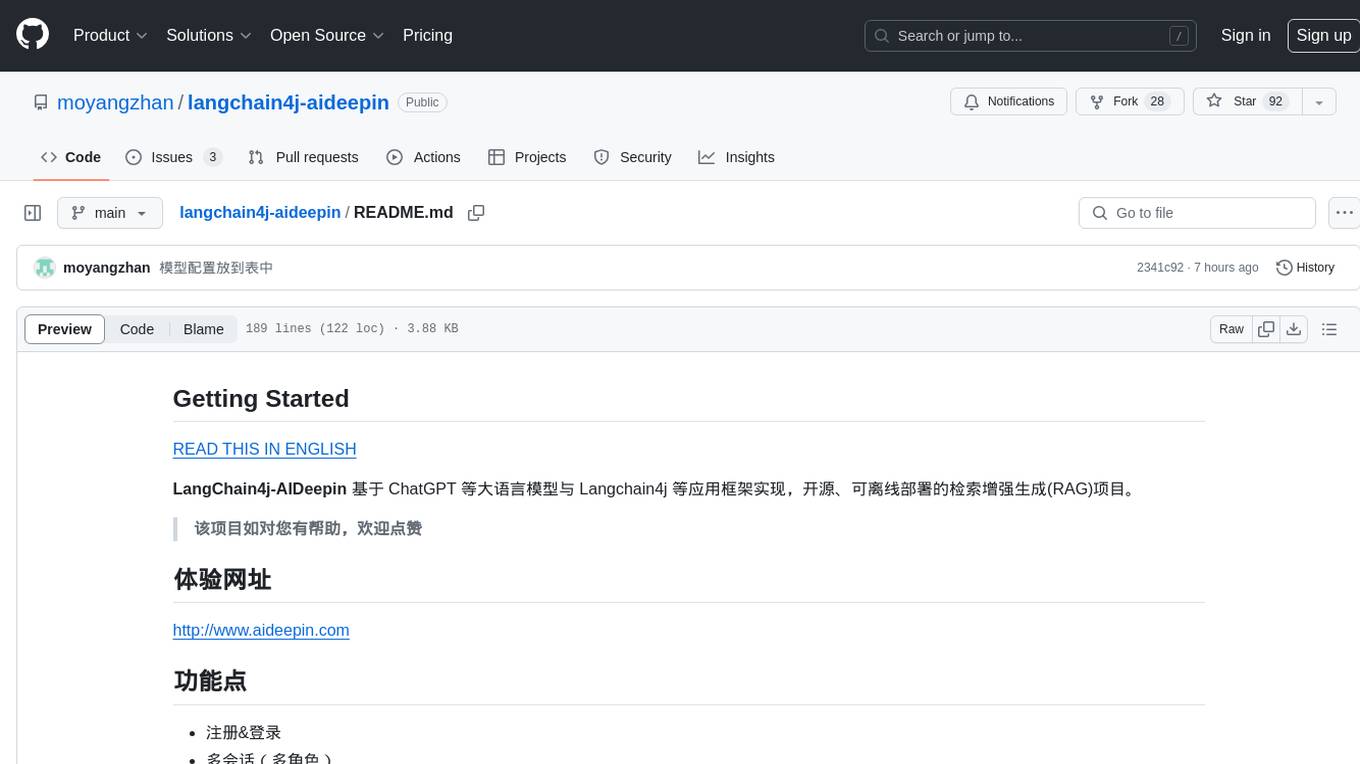
langchain4j-aideepin
LangChain4j-AIDeepin is an open-source, offline deployable retrieval enhancement generation (RAG) project based on large language models such as ChatGPT and Langchain4j application framework. It offers features like registration & login, multi-session support, image generation, prompt words, quota control, knowledge base, model-based search, model switching, and search engine switching. The project integrates models like ChatGPT 3.5, Tongyi Qianwen, Wenxin Yiyuan, Ollama, and DALL-E 2. The backend uses technologies like JDK 17, Spring Boot 3.0.5, Langchain4j, and PostgreSQL with pgvector extension, while the frontend is built with Vue3, TypeScript, and PNPM.
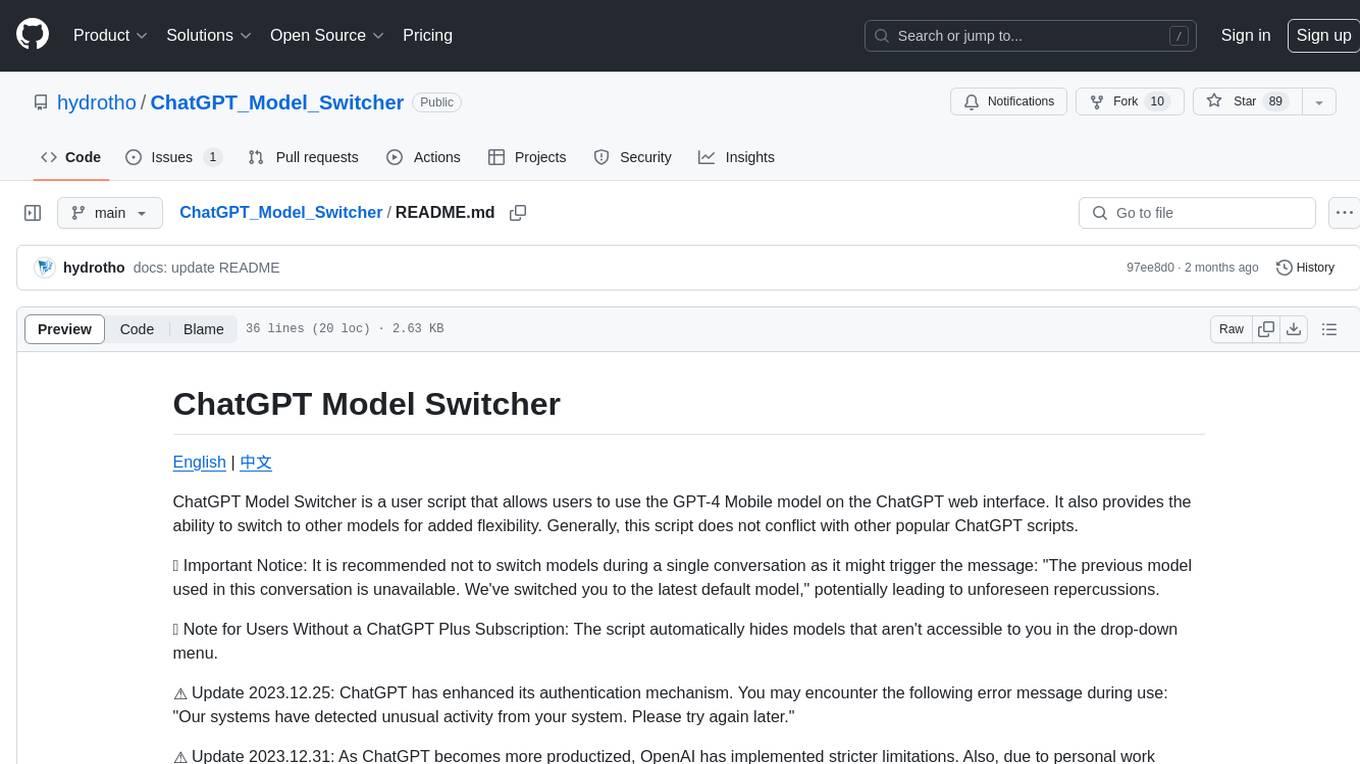
ChatGPT_Model_Switcher
ChatGPT Model Switcher is a user script that enables users to utilize the GPT-4 Mobile model on the ChatGPT web interface and switch to other models for added flexibility. It ensures compatibility with multiple mirror sites and hides inaccessible models for non-subscribers. However, recent updates have introduced stricter limitations due to enhanced authentication mechanisms and personal constraints, potentially affecting the project's ability to override usage limits. Users are encouraged to contribute to the project if capable.
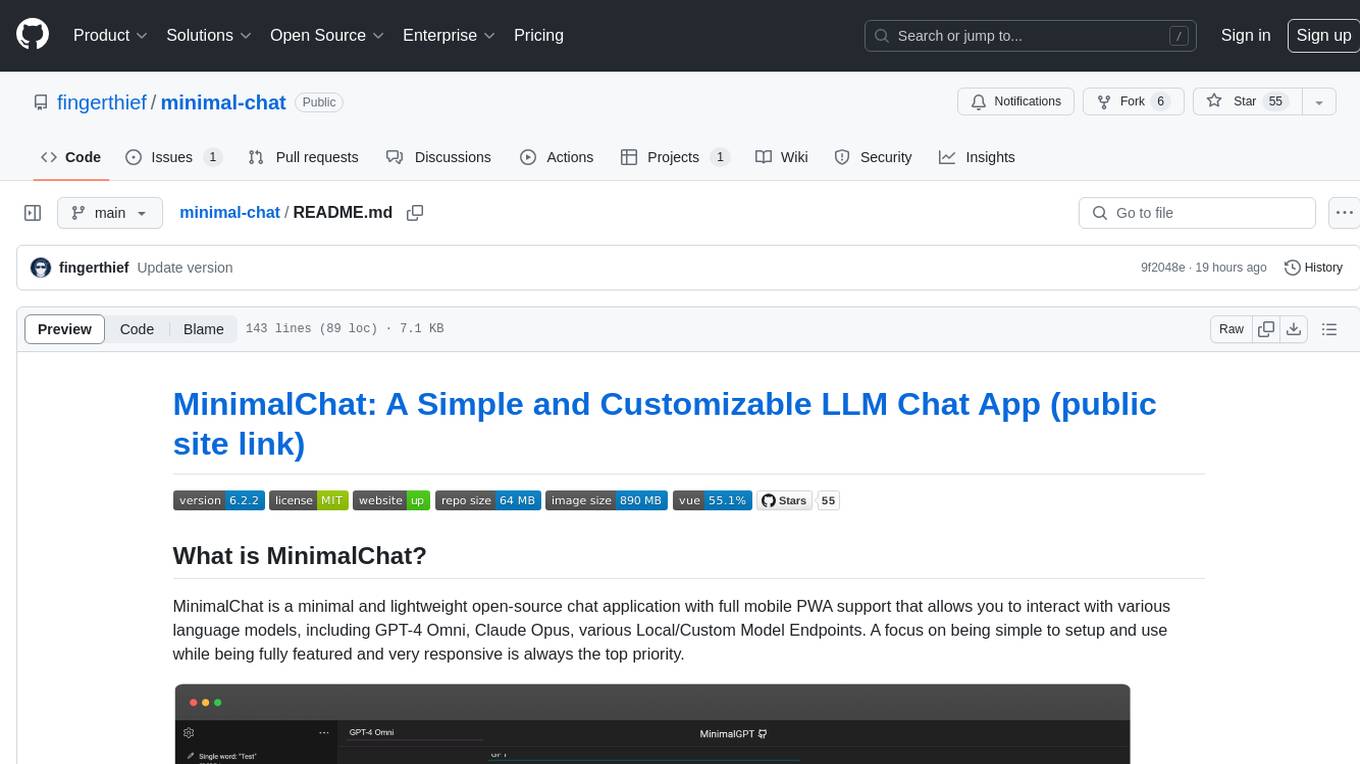
minimal-chat
MinimalChat is a minimal and lightweight open-source chat application with full mobile PWA support that allows users to interact with various language models, including GPT-4 Omni, Claude Opus, and various Local/Custom Model Endpoints. It focuses on simplicity in setup and usage while being fully featured and highly responsive. The application supports features like fully voiced conversational interactions, multiple language models, markdown support, code syntax highlighting, DALL-E 3 integration, conversation importing/exporting, and responsive layout for mobile use.
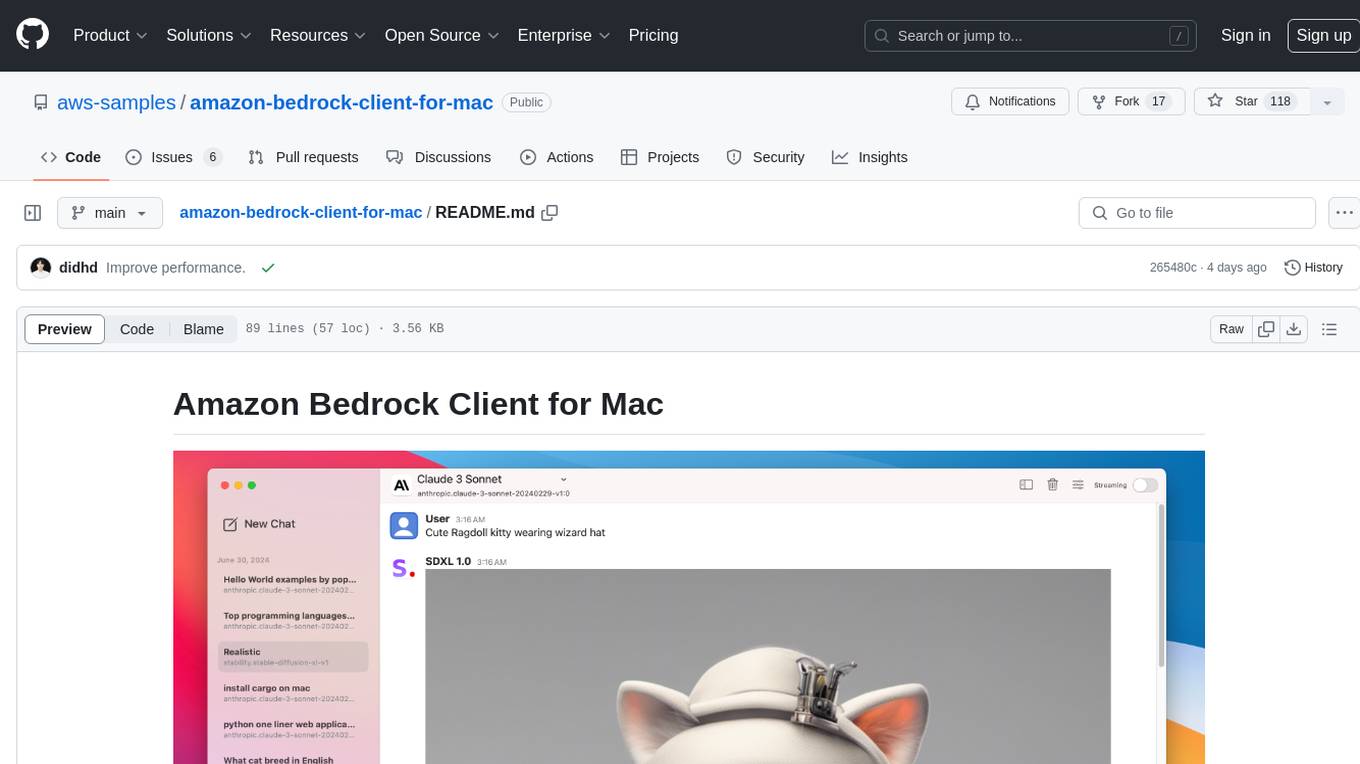
amazon-bedrock-client-for-mac
A sleek and powerful macOS client for Amazon Bedrock, bringing AI models to your desktop. It provides seamless interaction with multiple Amazon Bedrock models, real-time chat interface, easy model switching, support for various AI tasks, and native Dark Mode support. Built with SwiftUI for optimal performance and modern UI.
For similar jobs

LLMStack
LLMStack is a no-code platform for building generative AI agents, workflows, and chatbots. It allows users to connect their own data, internal tools, and GPT-powered models without any coding experience. LLMStack can be deployed to the cloud or on-premise and can be accessed via HTTP API or triggered from Slack or Discord.

daily-poetry-image
Daily Chinese ancient poetry and AI-generated images powered by Bing DALL-E-3. GitHub Action triggers the process automatically. Poetry is provided by Today's Poem API. The website is built with Astro.

exif-photo-blog
EXIF Photo Blog is a full-stack photo blog application built with Next.js, Vercel, and Postgres. It features built-in authentication, photo upload with EXIF extraction, photo organization by tag, infinite scroll, light/dark mode, automatic OG image generation, a CMD-K menu with photo search, experimental support for AI-generated descriptions, and support for Fujifilm simulations. The application is easy to deploy to Vercel with just a few clicks and can be customized with a variety of environment variables.

SillyTavern
SillyTavern is a user interface you can install on your computer (and Android phones) that allows you to interact with text generation AIs and chat/roleplay with characters you or the community create. SillyTavern is a fork of TavernAI 1.2.8 which is under more active development and has added many major features. At this point, they can be thought of as completely independent programs.

Twitter-Insight-LLM
This project enables you to fetch liked tweets from Twitter (using Selenium), save it to JSON and Excel files, and perform initial data analysis and image captions. This is part of the initial steps for a larger personal project involving Large Language Models (LLMs).

AISuperDomain
Aila Desktop Application is a powerful tool that integrates multiple leading AI models into a single desktop application. It allows users to interact with various AI models simultaneously, providing diverse responses and insights to their inquiries. With its user-friendly interface and customizable features, Aila empowers users to engage with AI seamlessly and efficiently. Whether you're a researcher, student, or professional, Aila can enhance your AI interactions and streamline your workflow.

ChatGPT-On-CS
This project is an intelligent dialogue customer service tool based on a large model, which supports access to platforms such as WeChat, Qianniu, Bilibili, Douyin Enterprise, Douyin, Doudian, Weibo chat, Xiaohongshu professional account operation, Xiaohongshu, Zhihu, etc. You can choose GPT3.5/GPT4.0/ Lazy Treasure Box (more platforms will be supported in the future), which can process text, voice and pictures, and access external resources such as operating systems and the Internet through plug-ins, and support enterprise AI applications customized based on their own knowledge base.

obs-localvocal
LocalVocal is a live-streaming AI assistant plugin for OBS that allows you to transcribe audio speech into text and perform various language processing functions on the text using AI / LLMs (Large Language Models). It's privacy-first, with all data staying on your machine, and requires no GPU, cloud costs, network, or downtime.



